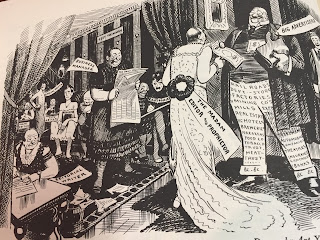(A 1912 cartoon by Art Young for The Masses)
Controversy still hangs over Howard Industries in Laurel,
Mississippi, as the federal Occupational Safety and Health Administration
continues its investigation into the March 15 death of a 36-year veteran worker
at the company.
Sixty-three-year-old Larry Moffett died as a result of what
the company called a “crush incident” when a heavy piece of equipment fell on
him. Details are sketchy beyond that point, but Moffett was a tank regulator
and leak tester and only two years away from retirement.
In a subsequent blog post on the incident, the Grossman Law Offices in
Dallas, Texas, noted that OSHA investigations give “people a false sense of
hope” and can take up to 18 months and, if the agency finds fault with the
company, it usually issues “paltry fines that hardly put a dent in the
company’s bottom line, and then move(s) on.” Furthermore, “what does this do to
help families facing medical bills, burial costs, lost wages, and the immense
pain caused by the loss of a loved one? Not much.”
A billion-dollar maker of primarily electrical transformers
that employs up to 4,000 workers, Howard Industries in Laurel has been showered
with taxpayer-funded government subsidies and local media adoration as well as state media
indifference for years even though its record makes it arguably one of the
state’s worst companies.
The death of a Howard Industries worker at its nearby
Ellisville, Mississippi, facility in January 2011 led to 17 OSHA safety
violation citations. “Two serious violations related to the fatality include not
requiring employees to use work safety practices dealing with live electrical
circuits, and failing to use locks and tags when de-energizing test equipment,”
an OSHA press release said in July 2011.
Workers had to be evacuated from the plant in March 2018
after two transformers caught on fire. OSHA fined the company $200,000 for 54
violations of work safety rules in 2008, the same year the plant was the site
of the nation’s largest raid on undocumented workers at the work place in
history. Three years later it pleaded guilty to conspiring to violate immigration laws and received a $2.5 million fine.
Thanks to the diligence of the Mississippi Immigration
Rights Alliance, Howard Industries was shamed into releasing 283 paychecks to
migrant workers that it had held back.
In 2012 the company agreed to a $1.3 million settlement of a
discrimination lawsuit by four black women who said they were refused jobs
because of the company’s preference for Latino workers.
Despite this dismal history, Howard Industries has benefited
from local tax exemptions for years, a $31 million state subsidy in 2002, plus
a $20 million bond issue from the county. Its horrible record for low wages
among its majority African American workforce brought in the NAACP back in 2015
and led the Laurel City Council to support the NAACP’s plea that Howard Industries
raise its wages and to threaten the company’s local tax exemption. Half the
workforce belonged to the International Brotherhood of Electrical Workers but
they still made between $3.55 and $6 an hour less than their counterparts in
other nearby plants. The council eventually changed its mind and backed off
amid a blistering attack by the local newspaper and likely behind-the-scenes
pressure on council members.
Howard Industries also has a record of rewarding friendly politicians.
It once rewarded state legislators with free laptop computers.
The Laurel Leader-Call
is an embarrassment of a newspaper that heaps such praise on Howard Industries
it could hardly be expected ever to do any real investigation of the company.
“We were fierce defenders of HI when out-of-towners embarked upon a crusade to
get its employees to unionize,” the newspaper editorialized some months ago,
“and we smacked around some past councilmen editorially when they tried to pull
HI’s tax exemption because of a handful of disgruntled employees.”
Ah, kowtowing, subservient, butt-kissing journalism remains
strong in Laurel, Mississippi!


At the time of the immigration raid (a big one, but later there were even bigger ones) there was a union at the plant (IBEW) that was trying to renew its contract. The quote from the newspaper would seem to imply that it's no longer there. What's the story on that? http://dbacon.igc.org/Imgrants/2008mississippiraid.html
ReplyDeleteDavid, I think the IBEW still has a local there, and at last count it represented about half the workforce as stated in the column. I've called IBEW but haven't heard back from them.
DeleteI am very instrested in your post because in your post's information is useful for me. Thank you.
ReplyDeleteQualified Production Facility New York
This comment has been removed by a blog administrator.
ReplyDelete